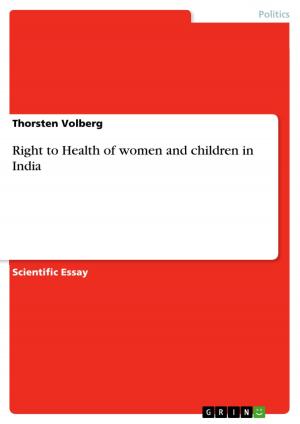Electoral reform in Germany and Canada
Lessons from the 2004 Canadian and the 2005 German election
Nonfiction, Social & Cultural Studies, Political Science, International, Foreign Legal Systems| Author: | Sebastian Grasser | ISBN: | 9783638823395 |
| Publisher: | GRIN Publishing | Publication: | June 30, 2007 |
| Imprint: | GRIN Publishing | Language: | English |
| Author: | Sebastian Grasser |
| ISBN: | 9783638823395 |
| Publisher: | GRIN Publishing |
| Publication: | June 30, 2007 |
| Imprint: | GRIN Publishing |
| Language: | English |
Seminar paper from the year 2006 in the subject Politics - Political Systems - General and Comparisons, grade: 1,0, Saint Mary's University (Saint Mary's University, Halifax, Canada), 29 entries in the bibliography, language: English, abstract: The voter turnout of 60.9% in the 2004 Canadian general election has been the lowest ever in Canadian electoral history. The election resulted in a minority government for Paul Martin's Liberals that lost votes after an infamous sponsorship scandal. This scandal undermined Liberal credibility as 'sums of money were paid illicitly, supposedly to promote national feeling in Quebec.' The Liberals could only win 135 seats with 36.7% of the popular vote, and more than half of their seats (75) came from Ontario. Canada's regional cleavages, i.e. its highly regionalized nature, are the origin of such a development. The electoral system, the single-member plurality, deteriorates this situation as it favors parties with a regional basis and leaves out parties with a small nationwide electorate. In contrast to Canada, German voters are familiar with elections where neither party can win the majority of seats in the German parliament, the Bundestag. The German electoral system favors coalitions, which is unknown to Canadian voters. This paper examines both the electoral system of Canada and Germany and shows overlapping in both system with the usage of two former elections as case study.
Seminar paper from the year 2006 in the subject Politics - Political Systems - General and Comparisons, grade: 1,0, Saint Mary's University (Saint Mary's University, Halifax, Canada), 29 entries in the bibliography, language: English, abstract: The voter turnout of 60.9% in the 2004 Canadian general election has been the lowest ever in Canadian electoral history. The election resulted in a minority government for Paul Martin's Liberals that lost votes after an infamous sponsorship scandal. This scandal undermined Liberal credibility as 'sums of money were paid illicitly, supposedly to promote national feeling in Quebec.' The Liberals could only win 135 seats with 36.7% of the popular vote, and more than half of their seats (75) came from Ontario. Canada's regional cleavages, i.e. its highly regionalized nature, are the origin of such a development. The electoral system, the single-member plurality, deteriorates this situation as it favors parties with a regional basis and leaves out parties with a small nationwide electorate. In contrast to Canada, German voters are familiar with elections where neither party can win the majority of seats in the German parliament, the Bundestag. The German electoral system favors coalitions, which is unknown to Canadian voters. This paper examines both the electoral system of Canada and Germany and shows overlapping in both system with the usage of two former elections as case study.















